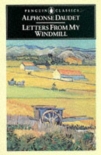Letters From My Windmill by Alphonse Daudet (the first e reader .txt) 📗

- Author: Alphonse Daudet
Book online «Letters From My Windmill by Alphonse Daudet (the first e reader .txt) 📗». Author Alphonse Daudet
From where I was, I could see an old chap shuffling calmly around thepaths. All day long, he trimmed the trees, dug the ground over, andwatered and dead-headed the flowers with great care. At sunset, he wentinto the small chapel, where the family dead lay, to put away thespade, the rakes, and the large watering cans, while displaying all therespectful tranquillity and serenity of a cemetery gardener. The manworked with a certain subliminal reverence, and always locked the vaultdoor quietly, as if wary of waking somebody. Within its great andglorious silence, the upkeep of this little garden troubled no one anddidn't by any means depress the neighbourhood; in fact, only theimmense sea and the infinite sky had more grandeur. This everlastingsiesta—surrounded as it was by the overwhelming sights and forces ofnature—brought a sense of eternal repose to everything in sight….
THE TWO INNS
I was on my way back from Nîmes, one crushingly hot afternoon in July.As far as the eye could see, the white, blistering road, was turning toclouds of dust between olive groves and small oaks, under a great,silver, hazy sun which filled the whole sky. Not a trace of shade, nota whisper of wind. Nothing except the shimmering of the hot air and thestrident cry of the cicadas' incessant din, deafening, hurried, andseeming to harmonise with the immense luminous shimmering…. I hadwalked for two hours in this desert in the middle of nowhere, whensuddenly a group of white houses emerged from the dust cloud in theroad in front of me. They were known as the Saint-Vincent coachinginns: five or six farms with long red roofed barns; and a dried upwatering hole in a would-be oasis of spindly fig trees. At the end ofthe village, two large inns faced each other across the road.
There was something striking about these inns and their strangesetting. On one side, there was a large, new building, full of life andbuzzing with activity. All the doors were ajar; a coach was in front,from which the steaming horses were being unhitched. The disembarkedpassengers were hurriedly drinking in the partial shade by the walls.There was a courtyard strewn with mules and wagons, and the wagonerswere lying down under the outhouses waiting to feel cool. Inside therewas the jumbled sound of shouting, swearing, fists banging on thetables, glasses clinking, billiard balls rattling, lemonade corkspopping, and above all that racket, a joyful voice, bursting with songloud enough to shake the windows:
The lovely Margoton,
Just as soon as night was day,
Took her little silver can,
To the river made her away….
… The inn on the other side was silent and looked completelyabandoned. There was grass under the gate, broken blinds, and a branchof dead holly on the door; all that was left of an old decoration. Theentrance steps were supported by stones from the road…. It was sopoor and pitiful, that it was a real act of charity to stop there atall, even for a drink.
* * * * *
As I went in, I saw a long gloomy, deserted room, with daylight,bursting in through three large, curtainless, windows, which just madeit look even more deserted and gloomy. There were some unsteady tables,with dust-covered glasses long abandoned on them. There was also abroken billiard table which held out its six pockets like beggingbowls, a yellow couch, and an old bar, all slumbering on in the heavy,unhealthy heat.
And the flies! Oh, God, the flies! I have never seen so many. They wereon the ceiling, stuck to the windows, in the glasses, in clusterseverywhere…. When I opened the door, there was a buzzing as if I hadjust entered a bee hive. At the back of the room, in a window, therewas a woman standing, her face pressed against the glass and totallyabsorbed in looking through it. I called to her twice:
—Hello, landlady!
She turned round slowly and revealed a pitiful peasant's face,wrinkled, cracked, earth coloured, and framed in long strands ofbrownish lace, like old women wear hereabouts. And yet, she wasn't anold woman, perhaps the tears had wilted her.
—What can I do for you? She asked me, drying her eyes.
—Just a sit down and a drink….
She looked at me, utterly astonished, and didn't move as if she hadn'tunderstood.
—This is an inn, isn't it?
The woman sighed:
—Yes … it's an inn, in a manner of speaking…. But why aren't youover the road like everybody else? It's a much livelier place….
—It's a bit too lively for my liking…. I'd rather stay here.
And without waiting for her reply, I sat down at a table. Once she hadsatisfied herself that I was genuine, she began to flit to and frobusily, opening drawers, moving bottles, wiping glasses, and flickingthe flies away…. You could see that a customer was quite an event forher. Now and then the unfortunate woman would hold her head as if shewas despairing of getting to the end of it.
Then she disappeared into a back room; I heard her take up some keys,fiddle with the locks, rummage in the bread bin, huff and puff, do somedusting, wash some plates. And from time to time … a muffled





Comments (0)